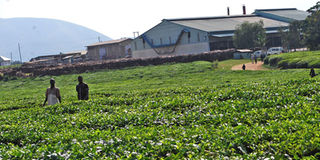Prime
Farmers uproot tea plants over low prices

Farmers walk through a tea plantation near Kayonza Growers Tea Factory in Kanungu District in 2015. PHOTO/ALFRED TUMUSHABE
What you need to know:
- The farmers claim that the drop in prices of green tea leaves from Shs500 to Shs200 per kilogramme has discouraged them from the enterprise yet they incur high costs of plucking, fertiliser application and the general maintenance of the plantations.
A section of tea farmers in Kanungu District have started uprooting their plantations due to persistent low prices from the crop.
Areas where farmers have started uprooting their tea plantations include; Kayonza Sub-county, Buhoma Town Council, Butogota Town Council, Kyeshero Sub-county and Mpungu Sub-county.
The farmers claim that the drop in prices of green tea leaves from Shs500 to Shs200 per kilogramme has discouraged them from the enterprise yet they incur high costs of plucking, fertiliser application and the general maintenance of the plantations.
“I had 14 acres of tea and I have already uprooted half of it because of low prices. I plan to venture into maize and banana growing so that I can have something for my family to eat,” Mr Francis Byamukama from Kayonza Sub-county said last week.
Mr Mark Byabagambi, another farmer from Buhoma Town Council, revealed that while his education was financed by his father’s tea estates, currently, he is unable to take his children to school because of the low prices of green leaf.
“Of the Shs200 paid per kilo of green leaf, the plucker takes Shs130, leaving me with Shs70. This is not sustainable given the fact that I have to purchase fertilisers and pay casual workers for the maintenance of the tea plantation,” Mr Byabagambi said.
Mr Frank Byaruhanga, the chairperson of South Western Tea Nursery Bed Operators, revealed that they have already submitted a petition to Parliament and Cabinet over the low tea prices.
He is optimistic that this will solve the challenges faced by the tea farmers in the district.
Mr Joshua Rukundo, the chairperson of the district production, trade and natural resources committee, also asked the farmers to be patient as they engage the government over the challenges in the tea sector.
The district chairperson, Mr Sam Arinaitwe Kajojo, told the district council last week that tea farmers are demotivated and need support.
“There is a need for collective efforts to encourage the farmers not to lose hope in the tea enterprise. We shall continue to engage the government to ensure that tea farmers get better prices for their produce,” Mr Kajojo said.
The General Manager at Kayonza Growers’ Tea Factory, which is the major buyer of green tea leaf in Kanungu District, Mr Jotham Musinguzi, attributed the challenge to the low prices of processed tea at the auction market at Mombasa in Kenya.
“Of recent, our exported tea has been fetching less than a dollar at the Mombasa auction market and as such we cannot reduce the amount paid to the farmers that supply us with green tea leaves,” Mr Musinguzi said.
He added: “Previously, the factory was able to purchase fertilisers for farmers but due to financial constraints, we can no longer do so and this has resulted in poor quality of the green tea leaf.
“Huge costs of using generators to run the tea processing because of unstable hydroelectricity supply is another reason we had to reduce the price of green tea leaves.”
Tea growing in Kigezi Sub-region was launched by President Museveni in 2008 and this resulted in the establishment of about seven tea processing factories in the area. About 13,700 farmers are involved in tea growing in Kanungu.




